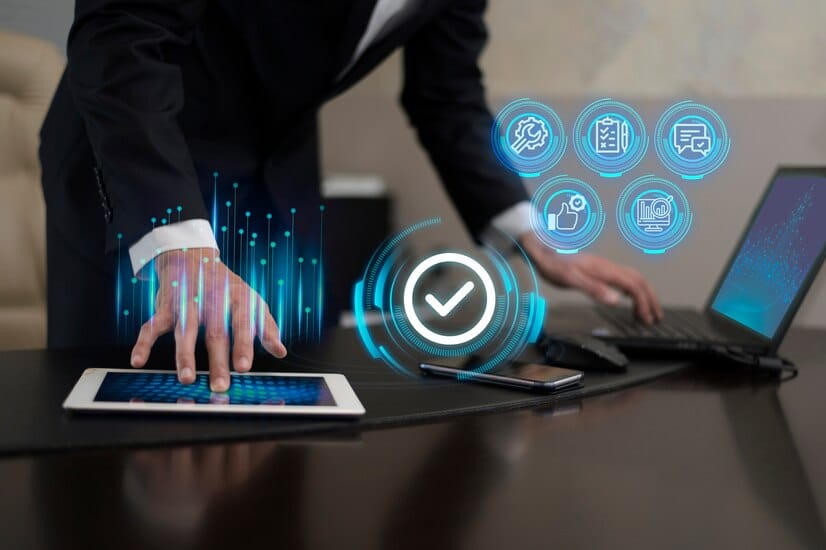Remote Working Safety: 7 Cybersecurity Tips to Protect Your Data

Top Reasons Why Companies Need IT Managed Services Today
November 5, 2024The Covid-19 pandemic has drastically and disruptively altered people’s lives, businesses, and digital infrastructures. The primary cause for corporations allowing their staff to work from home or distant locations instead of their offices in this pandemic.
Cyberthreats That Require Attention: A few remote IT help desk security pointers for staff members who operate remotely are listed below. Let’s investigate them.
Cybersecurity Advice for Workers Who Are Remote:
Employ a Virtual Private Network, or VPN:
Employees who operate remotely should use the company’s VPN to get a secure internet connection by rerouting their data flow through an encrypted channel. Hackers like to target unprotected connections. Because a VPN obscures your IP address and masks your identity, it can withstand external attacks.
Advantages:
- It hides your critical data It helps you to overcome firewalls and geo-blocks
- Reduces data snooping; it avoids bandwidth throttling and data throttling
- It is economical
- Online links are encrypted
- With a VPN, remote workers may secure their data from hackers by encrypting network traffic and hiding your monitoring activity from being seen.
- Research suggests that more than 26% of internet users rely on VPN services. Engage an IT helpdesk support service to determine which VPN service best suits your needs.
- Avoid using public Wi-Fi for your remote workstation and never switch it off when working.
Protect Data Confidentiality by Encrypting It:
To render data unreadable at your distant workstation, encryption is essential. This method jumbles the content so the hacker cannot read it at the same time. With the decryption key, only the intended receiver may read and decode the message. When implemented on a website, the SSL (Secure Socket Layer) certificate has this kind of power.
Entrepreneurs, install an SSL certificate on your website to safeguard it with encryption technology. Despite the abundance of SSL service providers, seek the most affordable SSL certificate together with excellent customer care.
The risk of losing or compromised sensitive data increases when workers work remotely; nevertheless, firm data can be secured if data is encrypted using an SSL certificate and is exchanged between the company website and the remote workspace.
Keep Devices Separate
It’s critical to maintain device separation between home and office laptops in order to safeguard company data. Working on your laptop for professional purposes when it’s not securely locked up could put the data and information of the company at risk.
Most companies spend money on an IT staff that handles frequent security updates, scans frequently, keeps an eye out for questionable activity, and removes unauthorized access. For personal laptops, similar stringent security monitoring is typically not feasible.
Make sure that no one uses your official device—not even your family or friends. Never divulge the login information for a location that stores sensitive data. Using the laptop that was provided to you by the office is the greatest option.
Use Two-Factor Authentication (2FA) or Multi-Factor Authentication (MFA):
In the event of a cyberattack, having several authentication methods for your computer network is always beneficial. Hackers might be able to breach one shield, but they might not be able to breach the others, keeping your network safe.
Because cybercriminals must successfully complete two or more verifications before they can enter the network, using MFA for your distant location helps deter them from doing so.
Example: In addition to entering passwords, logging into the network or account may require an OTP or code verification provided via SMS.
According to research, using MFA reduces user identity risk by 99.9%. By thwarting hackers’ attempts, MFA or 2FA assists the IT staff in reducing their workload and in assisting naive staff members to protect their systems from these types of online predators.
Employ a Centralized Storage Location
For security purposes, it is advisable to have a centralized storage facility for all personnel who work in offices and remote locations.
It is seen that workers who are in remote areas frequently save the files locally on their computers. They have no idea what centralized storage facilities or cloud services are. This increases the risk to the data of your company because unprotected storage is easily compromised.
Please let your remote employees know about this and provide them with training on how to securely store data in these kinds of places. For remote workers, this will ease data security, availability, and accessibility.
To protect your storage and stop unauthorized access, use a firewall. Also, take appropriate backups (centralized backup to cloud) in the event of contingencies.
Watch Out for Zoom and Video Conferencing
These platforms are great for connecting with employees who work remotely or from home, but they should be used with caution.
Trolls disrupt your Zoom meetings by putting up offensive images, videos, or other information. They also launch public calls as an attack. By keeping an eye on your meetings, they could breach your privacy and obtain confidential data.
Advice: The best defense against this debacle is to always provide links to Zoom invites or meet IDS in a private setting with strong passwords.
- Use Zoom to install all updates on all devices.
- Make a waiting area with just those who have been invited.
- After the meeting starts, lock the space.
- Maintain the privacy of your Zoom meetings.
- For data privacy and security, make sure there is end-to-end encryption.
Keep your Devices Secured:
The number of people working from home has increased as a result of the epidemic, making data security an increasingly important and difficult responsibility. Therefore, the best way to guarantee data protection and device security is to keep your devices up to date and your systems protected with anti-virus/anti-malware software.
Security precautions that must be taken:
- Prohibit the use of any free Wi-Fi hubs.
- If you plan to use any public Wi-Fi, use a VPN.
- Educate your staff about cyberthreats, including their signs and remedies.
- For more security, use MFA and complicated passwords.
- Update your operating system regularly
- Limit access to sensitive data.
Provide your remote employees with the necessary training so they can protect their devices from malicious URLs and codes by adhering to security procedures.
Concluding:
VPNs, strong passwords, and appropriate email etiquette all contribute to the security of remote work. Using end-to-end encryption and the previously indicated advice, this process may be readily safeguarded, ensuring successful remote working.
Concordant One Tech provides IT & Security Risk Assessment services to assist you in understanding how to accomplish it. Our knowledgeable specialists will assess your IT configuration and security procedures, identify any potential vulnerabilities, and provide useful advice. Additionally, they will demonstrate how managed IT services may lower risks, increase output, and streamline your company’s operations. By using this proactive approach, you will be able to make well-informed decisions on your cybersecurity and IT strategy. Use the assessment to find out how Remote IT services in San Francisco CA can transform your business



